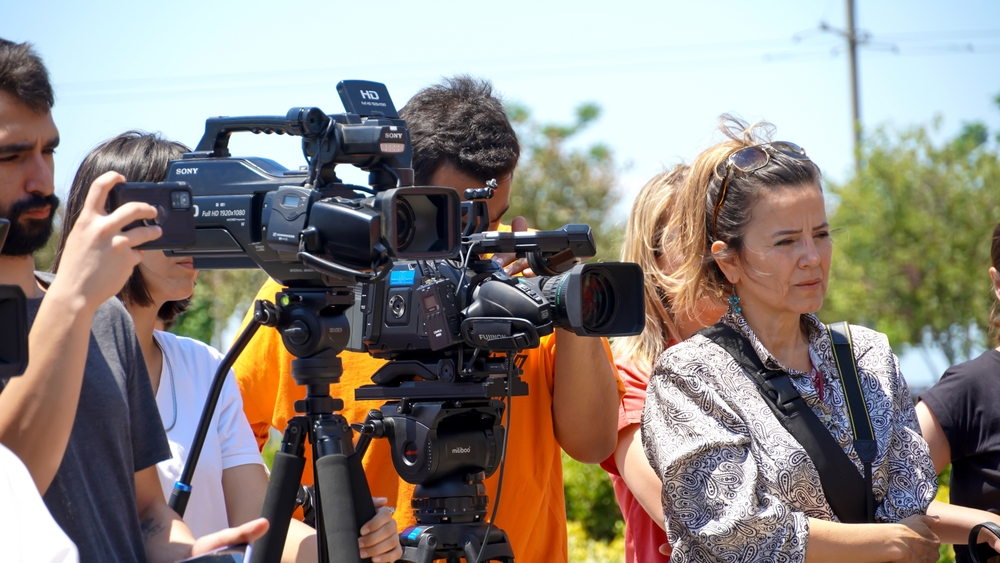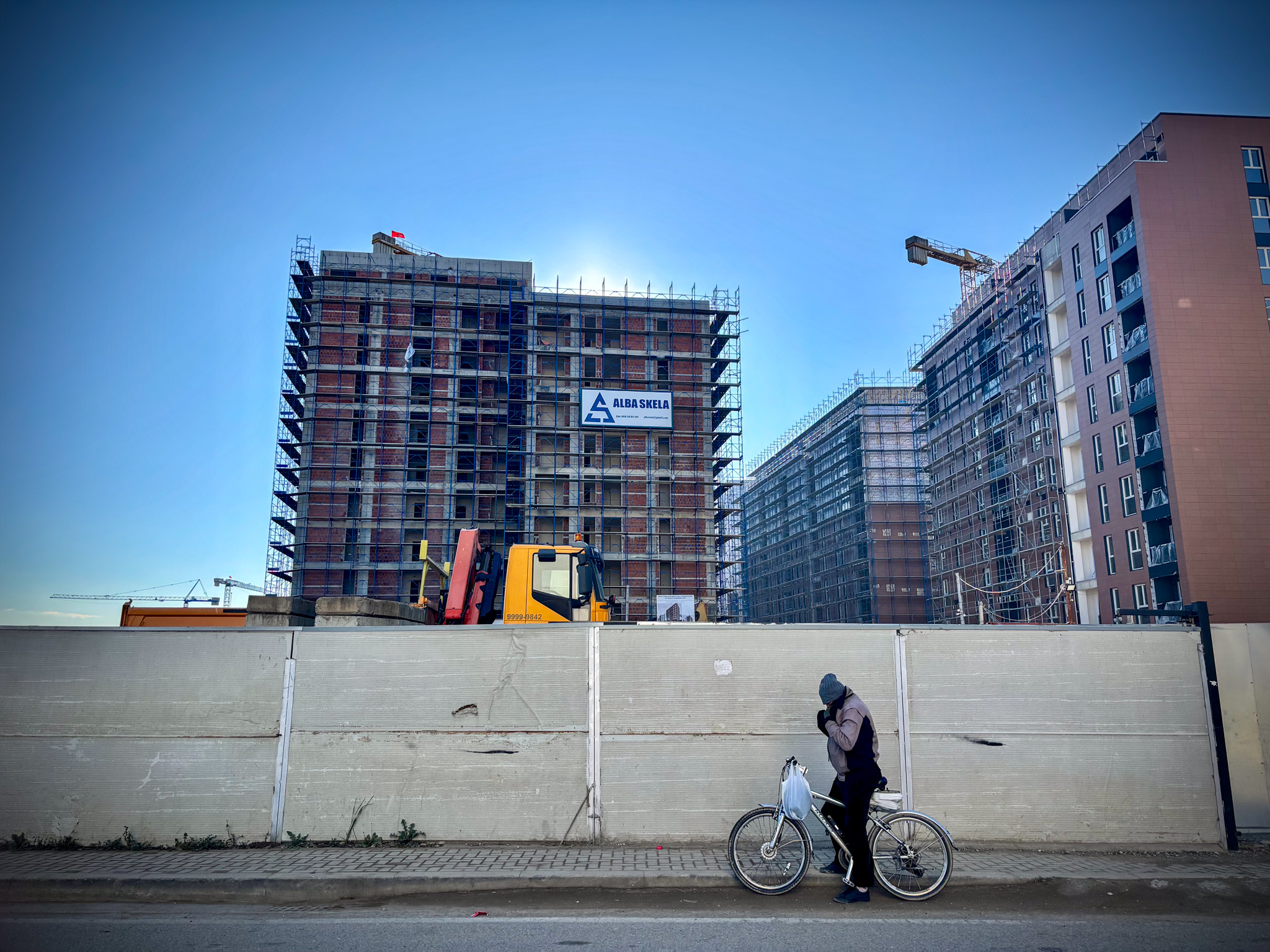Reporting in Turkey: a dangerous job
Arbitrary detentions, a manipulative law on disinformation, beatings, mass surveillance, a politicised judiciary and financial pressure, all make Turkey a very unfriendly place for journalism. Things can get worse for those who fled their home countries

Reporting-in-Turkey-a-dangerous-job
A protest by journalists in Izmir, Turkey © idiltoffolo/Shutterstock
The new Turkish disinformation law, that criminalises disinformation, started making its victims. 19 criminal cases were opened only this year against journalists, the majority of them following coverage of the February earthquakes that hit the country. Being critical against the government’s response to the emergency ended up being equated to disseminating false information. It was the case of journalist Can Ataklı , when he commented about the negligence of the state in the earthquake. MHP Deputy Chairman Feti Yıldız filed a complaint against him for the crimes of publicly disseminating false information, insulting religious values, and insulting the state.
At the same time, Turkey’s media regulatory bodies have all abused their powers to target and penalize independent media. In the first half of 2023, the media regulator RTUK imposed 31 fines worth approximately 800.000€ to media outlets, the large majority of which are critical to the government. At the same time, the State Press Advertising Agency imposed financial penalties on independent newspapers by withdrawing state advertising, denying them an important source of revenue. Ignoring a ruling of the Constitutional court against the agency’s arbitrary sanctions, the newspapers Evrensel, often very critical towards the government, had its right of to receive public ads permanently revoked.
In 2022, the Information and Communications Technologies Authority (BTK) was embroiled in a scandal known as “BTK-Gate”, following the revelation that it obliged internet providers to provide data of millions of internet users without a court order, a form of mass surveillance that jeopardises the rights of journalists and their sources.
The safety of journalists is also under increasing threat. The Mapping Media Freedom platform , managed by the MFRR consortium, has recorded 26 cases of assaults against journalists in Turkey in the past year alone. It was the case of 14 journalists who were attacked by the gendarmeries while reporting in the distict of Muğla, in South Western Turkey, where environmental activists and residents were protesting against the construction of a coal mine. The gendarmerie attacked protestors and journalists with batons, water cannons and tear gas, and the equipment of several reporters was damaged or destroyed during the attack.
These forms of violence also come from the demonization of critical journalism as illegitimate, a threat to national security, and even equated to terrorism. The fact that these assaults often result in impunity in courts fuels the risk that the perpetrators feel safe and allowed to continue with their actions.
In fact, there is no room for improvement for press freedom in Turkey without addressing the mother of all problems: the lack of impartiality and independence of the judiciary. Turkey’s politics heavily influence the work of courts, prosecutors and judges. Together with poorly drafted laws that allow space for manipulation and loose interpretation, it means that it is very hard for journalists to obtain justice when their rights are violated.
Just as in Afghanistan
For journalists with refugee or migrant status, the situation is even worse, as they risk deportation or blackmail if they end caught in the repressive net casted against journalism. Syrian journalists contacted by RSF in July reflected their mood saying: “My employer warned me that if I do not show up for work, I am going to lose my job. On the other hand, if I go out on the streets, I could be caught and sent back to Syria. I don’t know what to do” said one of them.
Speaking to OBCT, the General Coordinator of Medya ve Göc Dernegi (Media and Migration Association) Dilan Taşdemir underlined the need for existing media organisations to collaborate with and employ journalists who are refugees when reporting on migration, as this would have a significantly positive impact on the representation of refugees in the media across Turkey.
The association recently run three separate focus group meetings with Turkish, Syrian and Afghan journalists. Refugee journalists in Turkey face additional issues which make it difficult for them to work and to make a living. Problems arise from the need for a permit issued by the authorities to relocate, to travel from one city to another, the obligation to return to the registered city before the permit expires, the inability to work and earn money outside the city where they reside.
While Syrian refugees are granted the already inadequate temporary protection status, someone from Afghanistan has to risk a much longer, more painful process to obtain similar rights in Turkey, a process that is often tiresome and sickening for someone who has fled the oppressive Taliban regime. For many, the difference between being a journalist in Afghanistan and being a journalist in Turkey is negligible. As one of the journalists stated: “Reporting in Turkey is just as challenging as in Afghanistan”.
| This publication was produced within the Media Freedom Rapid Response (MFRR), co-funded by the European Commission. The contents of this publication are the sole responsibility of Osservatorio Balcani Caucaso Transeuropa and its partners and can in no way be taken to reflect the views of the European Union. |
Reporting in Turkey: a dangerous job
Arbitrary detentions, a manipulative law on disinformation, beatings, mass surveillance, a politicised judiciary and financial pressure, all make Turkey a very unfriendly place for journalism. Things can get worse for those who fled their home countries

Reporting-in-Turkey-a-dangerous-job
A protest by journalists in Izmir, Turkey © idiltoffolo/Shutterstock
The new Turkish disinformation law, that criminalises disinformation, started making its victims. 19 criminal cases were opened only this year against journalists, the majority of them following coverage of the February earthquakes that hit the country. Being critical against the government’s response to the emergency ended up being equated to disseminating false information. It was the case of journalist Can Ataklı , when he commented about the negligence of the state in the earthquake. MHP Deputy Chairman Feti Yıldız filed a complaint against him for the crimes of publicly disseminating false information, insulting religious values, and insulting the state.
At the same time, Turkey’s media regulatory bodies have all abused their powers to target and penalize independent media. In the first half of 2023, the media regulator RTUK imposed 31 fines worth approximately 800.000€ to media outlets, the large majority of which are critical to the government. At the same time, the State Press Advertising Agency imposed financial penalties on independent newspapers by withdrawing state advertising, denying them an important source of revenue. Ignoring a ruling of the Constitutional court against the agency’s arbitrary sanctions, the newspapers Evrensel, often very critical towards the government, had its right of to receive public ads permanently revoked.
In 2022, the Information and Communications Technologies Authority (BTK) was embroiled in a scandal known as “BTK-Gate”, following the revelation that it obliged internet providers to provide data of millions of internet users without a court order, a form of mass surveillance that jeopardises the rights of journalists and their sources.
The safety of journalists is also under increasing threat. The Mapping Media Freedom platform , managed by the MFRR consortium, has recorded 26 cases of assaults against journalists in Turkey in the past year alone. It was the case of 14 journalists who were attacked by the gendarmeries while reporting in the distict of Muğla, in South Western Turkey, where environmental activists and residents were protesting against the construction of a coal mine. The gendarmerie attacked protestors and journalists with batons, water cannons and tear gas, and the equipment of several reporters was damaged or destroyed during the attack.
These forms of violence also come from the demonization of critical journalism as illegitimate, a threat to national security, and even equated to terrorism. The fact that these assaults often result in impunity in courts fuels the risk that the perpetrators feel safe and allowed to continue with their actions.
In fact, there is no room for improvement for press freedom in Turkey without addressing the mother of all problems: the lack of impartiality and independence of the judiciary. Turkey’s politics heavily influence the work of courts, prosecutors and judges. Together with poorly drafted laws that allow space for manipulation and loose interpretation, it means that it is very hard for journalists to obtain justice when their rights are violated.
Just as in Afghanistan
For journalists with refugee or migrant status, the situation is even worse, as they risk deportation or blackmail if they end caught in the repressive net casted against journalism. Syrian journalists contacted by RSF in July reflected their mood saying: “My employer warned me that if I do not show up for work, I am going to lose my job. On the other hand, if I go out on the streets, I could be caught and sent back to Syria. I don’t know what to do” said one of them.
Speaking to OBCT, the General Coordinator of Medya ve Göc Dernegi (Media and Migration Association) Dilan Taşdemir underlined the need for existing media organisations to collaborate with and employ journalists who are refugees when reporting on migration, as this would have a significantly positive impact on the representation of refugees in the media across Turkey.
The association recently run three separate focus group meetings with Turkish, Syrian and Afghan journalists. Refugee journalists in Turkey face additional issues which make it difficult for them to work and to make a living. Problems arise from the need for a permit issued by the authorities to relocate, to travel from one city to another, the obligation to return to the registered city before the permit expires, the inability to work and earn money outside the city where they reside.
While Syrian refugees are granted the already inadequate temporary protection status, someone from Afghanistan has to risk a much longer, more painful process to obtain similar rights in Turkey, a process that is often tiresome and sickening for someone who has fled the oppressive Taliban regime. For many, the difference between being a journalist in Afghanistan and being a journalist in Turkey is negligible. As one of the journalists stated: “Reporting in Turkey is just as challenging as in Afghanistan”.
| This publication was produced within the Media Freedom Rapid Response (MFRR), co-funded by the European Commission. The contents of this publication are the sole responsibility of Osservatorio Balcani Caucaso Transeuropa and its partners and can in no way be taken to reflect the views of the European Union. |











